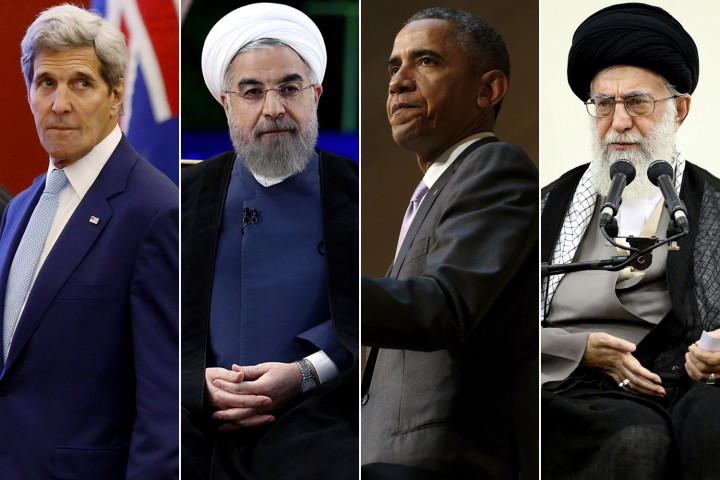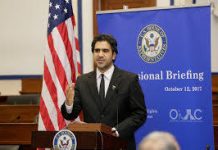Obama’s eight years of failure with Iran’
Amir Basiri/Washington examiner/November 20/16
Eight years ago, when President Obama took office, he chose to base his Middle East policy on reaching out to the Iranian regime and launching a new round of dialogue and rapprochement.
It was perceived that a policy founded on appeasement and concessions could transform a regime renowned for seeking nuclear weapons, a sponsor of terrorism, an exporter of fundamentalism and an outspoken enemy of the United States into an ally that could help Obama resolve the many crises riddling the Middle East.
The past eight years have proven this policy to be an utter failure. With Obama now heading out of office, his only achievement has been the Joint Comprehensive Plan of Action, a tentative deal that curbs Iran’s nuclear ambitions in a limited way. The deal is reversible, lacks any reliable safeguards and is mainly dependent on a constant string of concessions to Tehran and the ruling mullahs’ promise to stay true to their word.
The rest leaves much to desire.
Narrowly focused on avoiding driving the mullahs away from the negotiation table and the nuclear deal, Obama opted to give Tehran a free hand in its other nefarious activities.
Therefore, as popular uprisings erupted in Iran following the rigged 2009 elections, the Obama administration chose to remain on the sidelines and avoid supporting the Iranian people’s cry for democracy.
While disenchanting the masses who expected the international community to stand along their side against injustice, the move also encouraged the Iranian regime to continue repressing its own people with impunity.
As a result, during Obama’s tenure, the human rights situation in Iran has declined steeply, under both so-called “hardliner” and “moderate” administrations. Iran has witnessed an unprecedented rise in executions under Iranian President Hassan Rouhani and remains the record-holder of executions per capita.
Obama also decided to give leeway to the Iranian regime in pursuing its regional agenda, lest it walk away from the nuclear deal. This has cost the U.S. its regional allies and hundreds of thousands of people their lives.
The gap left by the hasty and premature withdrawal of U.S. troops from Iraq allowed the Iranian regime to virtually take over the country’s political and military institutions, undoing all measures carried out to unite the country, driving a wedge into Iraq’s sectarian divide and paving the way for the re-emergence of the Islamic State.
Elsewhere in Syria, the people’s struggle to oust the dictatorship ruling their country has prolonged into a five-year crisis that has seen the deaths of 500,000 Syrians, largely because of the intervention of the Iranian regime and its efforts to shore up the Syrian President Bashar Assad’s regime with troops and supplies. Again, the Obama administration’s dithering and its retreat from the promise to intervene in wake of Assad’s horrible chemical attack against a Damascus suburb prodded the Iranian regime to redouble its efforts and also draw Russia into the fray.
Despite the presumption held by the Obama administration that Tehran would finally change course toward becoming a regional ally of the U.S. in the post-JCPOA era, the Iranian regime has continued its mischief with renewed fervor, fueled by the economic windfall it has obtained after signing the accord. Today, Iran-supplied missiles and Iranian boats are making the Persian Gulf unsafe for U.S. ships.
All in all, eight years of appeasement and concessions have left the Middle East in chaos and on the verge of an all-out conflict set to propagate across the globe.
Now, with a new president slated to take office in January, it’s time for a total revamp of the policy toward Iran and the Middle East.
If there’s one thing to be learned from the past eight years, it is that appeasing the fundamentalist regime ruling Iran will never yield positive results. Neither will a siloed approach which will only account for part of the problems caused by Tehran.
The Iranian regime must be recognized for the totality of its nefarious deeds, and concrete steps must be taken to hold it to account for its human rights violations and its terrorist agenda in neighboring countries instead of giving it ground to do as it will under the banner of fighting ISIS.
Meanwhile, the Iranian people must be supported in their plight to establish freedom and democracy in their country and be given their due credit as the true force capable of rooting out extremism in Iran and, by extension, the entire region.
Obama picked the wrong fights and the wrong sides to the detriment of the Iranian people, the Middle East nations and the U.S. itself. Let us hope President-elect Trump avoids repeating such mistakes.





















